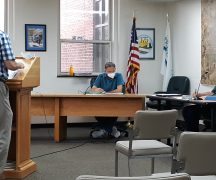By JAN LARSON McLAUGHLIN
BG Independent News
The worst part about COVID-19 for Wade Gottschalk was feeling like he was breathing through a straw.
“That was the scariest part,” Gottschalk, of Bowling Green, said Wednesday after two weeks of struggling through the virus.
He is still unable to carry on a conversation without coughing. But he has been without a fever for three days, and feels he is over the worst.
Gottschalk, who is executive director of the Wood County Economic Development Commission, is one of the “presumptive” cases of COVID-19 in the county. His wife, Jennifer, who works at the Lucas County Health Department, tested positive for the virus on March 24. Once Wade came down with the symptoms, it was assumed he had contracted it too.
“I started running a fever,” he said. “They didn’t have enough tests at the time.”
The couple went through the symptoms of fevers, coughing and shortness of breath.
“It just never stopped,” Gottschalk said.
Then, his fever went away – only to return again.
“It came back, and my cough was getting worse,” he said.
Jennifer, who has underlying health issues, struggled with the symptoms.
“Her cough was far worse,” Wade said.
For Wade, who has asthma, the difficulty breathing was the worst.
“There were a couple days when it was like breathing through a straw,” he said.
His breathing was so labored, that Jennifer suggested that he go to the hospital. But Wade wanted to stay home.
“I wasn’t going to willingly go to the hospital,” he said. “I didn’t want to put someone else at risk in health care unless I really needed to.”
Wade has experienced pneumonia, bronchitis and fevers. But COVID-19 is different.
“I’ve dealt with those things,” he said. “This is bad, because it doesn’t go away. That was the scariest thing.”
The Gottschalks had telehealth meetings with their physician. But there are no antibiotics, and no known medicines yet that help people overcome COVID-19.
“There is no real treatment for this,” Wade said. “You just have to suffer. We’re used to taking medicine and feeling better. You just hack up a lung all day.”
Gottschalk also lost his appetite during the virus.
“I normally stuff myself constantly,” but he had no desire to eat.
The Gottschalks were already isolating at home prior to their COVID-19 symptoms. Jennifer was supervising the tracking of virus cases in Lucas County, and Wade had already begun working at home after the Wood County Commissioners suggested that county offices conduct business over the phone if possible.
“I followed that and was not meeting with people in person,” Gottschalk said. “That was probably a good thing” since otherwise he could have potentially exposed several people.
Wood County Health Department’s epidemiologist, Tyler Briggs, followed up with the Gottschalks to trace back possible exposure to others.
“We had already been socially distancing prior to this,” Gottschalk said. “We were trying to avoid other people, so we wouldn’t get it.”
As for their 13-year-old daughter, Hailey, she seems to have gotten through the period with very few symptoms.
“So far, so good,” her dad said. “She’s had a little bit of a cough.”
Hailey, a student at Bowling Green Middle School, has been able to focus on her online classes, Disney Plus shows and dancing. She is now working her way through Disney films from the 1930s to 1980s, her dad said.
Gottschalk complimented Bowling Green City Schools’ teachers and administration for their efforts.
“They’ve done a great job with this,” he said. “The teachers have been accessible to her” and communication from the administration has been helpful to parents, he said.
Since both Wade and Jennifer had to self-quarantine, the family relied on “lots of friends” to supply them with groceries.
“They drop it off on the front porch, so we’re not exposing anyone,” he said.
Gottschalk understands the difficulty of being cooped up at home. But he also sees the value of people staying at home right now.
“We need to really stop the spread of this thing as soon as we can,” he said.
As head of economic development in Wood County, Gottschalk has had plenty of time to worry about the impact of the pandemic on the economy.
“This is impacting everybody’s life in some form economically,” he said. “And the worst is yet to come.”
While necessary, he said, the state’s stay-at-home order is hurting many.
“If you’re not going out, you’re buying less,” he said.
Unemployment will continue to grow.
“It’s going to take a while to come back,” he said. “It’s not going to be flipping a switch and it’s all going to come back.”
“It’s not going to be instantaneous. There’s been too much damage to the economy to just roar back.”
Though businesses are suffering, Gottschalk said it would have been far worse had Ohio not taken decisive action early on.
“The economic issues could have been worse, and could have gone on longer.” he said. “It’s going to help get us through this faster.”
The priority has to be preventing the spread of the virus, Gottschalk said.
“This is not something you want to get,” he said of COVID-19. “It’s persistent. It doesn’t let up. There’s no treatment for it.”





